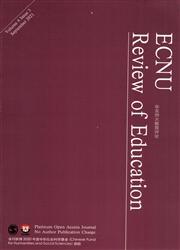影子教育的研究形式:缅甸私人补习的方法挑战和复杂性
IF 2.7
Q1 EDUCATION & EDUCATIONAL RESEARCH
引用次数: 0
摘要
越来越多的关于私人补习的文献,被广泛称为影子教育,涉及多个维度和角色。然而,许多研究没有充分捕捉到不同形式的辅导的多样性和影响。本文审查了缅甸的这些问题,突出了描述词和规定性质的复杂性和模糊性。采用混合方法设计,本研究在曼德勒地区和钦邦进行。数据来自对110名11年级学生、34名高中教师、30名家长、29名私人辅导提供者和2名私立学校所有者的访谈。本文根据辅导形式的风格和方向对其进行了分类,特别是讲座式教学和作业监督,包括导师制、班级规模、收费期限(如每年)、每个导师教授的科目数量和辅导地点。这项研究将这个话题从阴影中带了出来,以便对这一现象进行更清晰的分析,从而评估其影响。该研究通过展示在国内和国际比较文献中需要更大的清晰度和准确性,为更广泛的图景做出了方法论贡献。它还强调了问卷中预定类别的缺点和定性访谈的价值。本文章由计算机程序翻译,如有差异,请以英文原文为准。
Researching Forms of Shadow Education: Methodological Challenges and Complexities of Private Supplementary Tutoring in Myanmar
The growing literature on private supplementary tutoring, widely known as shadow education, addresses multiple dimensions and roles. However, many studies inadequately capture the diversity and implications of different forms of tutoring. This paper examines these matters in Myanmar, highlighting complexities and ambiguities in descriptors and in the nature of provision. Using a mixed-methods design, this study was conducted in Mandalay Region and Chin State. The data were obtained from interviews with 110 Grade 11 students, 34 high school teachers, 30 parents, 29 private tutoring providers, and two private school owners. The article categorizes tutoring forms based on their styles and orientations, particularly lecture-type teaching and homework supervision by guides, class sizes, durations of fee-charging (e.g., annually), the number of subjects taught per tutor, and tutoring locations. The study brings the topic out of the shadows for clearer analysis of the phenomenon and thus for assessment of its implications. The study makes a methodological contribution to the wider picture by demonstrating the need for greater clarity and precision in the national and international comparative literatures. It also underscores shortcomings of predetermined categories in questionnaires and the value of qualitative interviews.
求助全文
通过发布文献求助,成功后即可免费获取论文全文。
去求助
来源期刊

ECNU Review of Education
Social Sciences-Education
CiteScore
4.90
自引率
0.00%
发文量
41
审稿时长
10 weeks
 求助内容:
求助内容: 应助结果提醒方式:
应助结果提醒方式:


